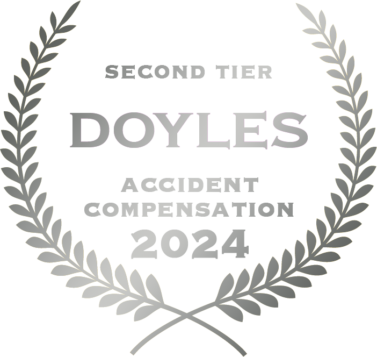
Shoulder Injury Compensation Payouts Australia – NSW.

If you’ve ever suffered a shoulder injury, you know how debilitating it can be. Even simple activities like getting dressed can become a challenge. But depending on what caused your shoulder injury and how it affects your ability to work, you might be entitled to claim compensation, including lump sum payments for shoulder injuries in some situations.
In this article, we explain everything you need to know about shoulder injury compensation payouts in Australia, how to tell if you’re eligible to claim, and how to claim your full entitlements.
When are you entitled to a shoulder injury compensation payout in Australia?
In NSW, there are a number of situations where you might be entitled to compensation or a lump sum for your shoulder injury:
If you’re injured at work, you might be able to claim workers compensation, also known as a WorkCover claim. WorkCover payouts for shoulder injuries are available regardless of whether your shoulder injury was caused by an accident or developed over time, as long as it was caused by your work or your work aggravated your injury.
This article includes detailed information on workers compensation shoulder injury settlements including lump sum payments.
If you injure your shoulder as a driver, passenger, pedestrian, cyclist, or motorcycle rider, you might be entitled to claim compensation payments or lump sums through the CTP insurance scheme. The CTP scheme has its own unique set of rules for compensation, which are covered in detail in our CTP Claims Guide.
For example, if you slip and fall in a supermarket or trip over a hazard in a shopping centre. This is also known as a public liability claim, and is covered in detail in our slip, trip and fall claim guide.
If you have to stop work due to your shoulder injury, and you have superannuation, you might be able to claim a TPD (total and permanent disability) lump sum. Many people with serious shoulder injuries are unaware that they’re entitled to this payment, which can be substantial. TPD claims are covered in detail in our Guide to Superannuation TPD Payouts.
WorkCover payouts for shoulder injuries.
If you’ve injured your shoulder at work, you can claim workers compensation (WorkCover) weekly payments to compensate you for lost income while you’re off work, as well as any medical and care expenses you’ve incurred. But there are two additional lump sum WorkCover payouts for shoulder injuries you might not be aware of, outlined below.
Lump sum payments for shoulder injury:
- Permanent impairment lump sum – this is a lump sum payment for shoulder injuries you can claim if your permanent impairment is assessed as being at least 11%. We cover permanent impairment in more detail later in this article.
- Work injury damages lump sum – if your injury was caused by your employer’s negligence, you might also be entitled to a lump sum for damages. This lump sum payment is determined by how much time you need off work and how much time you’ll need off work in the future.
These lump sum payments can be substantial, so it’s important to find out whether you’re entitled to them.
What’s the average workers compensation settlement for shoulder surgery?
It’s a common question, and while there’s no official data for average workers compensation shoulder injury settlements, your settlement can be estimated based on your permanent impairment rating.
For work-related injuries that require shoulder surgery, here’s a basic summary of how your total settlement amount would be calculated:
- Work out how much you’ve lost in wages by being off work.
- Add all the medical expenses you’ve incurred, including the cost of travel and home help you’ve needed.
- Have your degree of permanent impairment assessed by an approved doctor.
- Your permanent impairment lump sum settlement will be calculated based on the table below (updated November 2024).
| Degree of permanent impairment | Compensation range |
| 0 – 10% | $0 |
| 11% – 20% | $22,480 – $62,770 |
| 21% – 30% | $51,880 – $100,470 |
| 31% – 40% | $83,040 – $162,450 |
| 41% – 50% | $131,440 – $224,550 |
| 51% – 60% | $242,010 – $396,570 |
| 61% – 70% | $376,030 – $568,550 |
| 71% – 74% | $510,040 – $654,540 |
| 75% – 100% | $577,050 – $740,550 |
benefits guide – updated November 2024
Remember, if your employer’s negligence caused your accident, you might also be entitled to an additional lump sum payment for your shoulder injury – this is called work injury damages.
Call 13 15 15 or chat to us now for free advice
Chat nowFind out how much you can claim.
Get startedWhat are the most common workers compensation shoulder injury claims?
We’ve settled many workers compensation claims for shoulder injuries. Here are some of the most common claims:
This type of shoulder injury occurs if you damage the tendons and muscles around your shoulder joint. It’s often caused by repetitive overhead motions or lifting heavy objects. A workers compensation settlement for a torn rotator cuff can be significant – read on to find out more below, including the large lump sum payments that our client, Chris, received following an accident at work.
Depending on the extent of the damage you may end up requiring shoulder surgery for a variety of shoulder injuries. It’s important for you to be medically assessed to work out your permanent impairment rating, to see if you’re entitled to a lump sum payment. Read on below to find out more.
Frozen shoulder (Adhesive Capsulitis) is characterised by stiffness and limited range of motion in your shoulder joint. It often develops after an injury or prolonged immobilisation.
Shoulder bursitis is inflammation of the bursa sac in your shoulder. At work it might be caused by repetitive motions or trauma.
The labrum is a ring of cartilage that surrounds the shoulder socket. You might damage this because of a traumatic injury or repetitive strain.
This condition occurs if your shoulder’s tendons or bursa become pinched or compressed. This is often caused by repetitive overhead activities.
This condition is caused by inflammation of the tendons in the shoulder, which can be the result of overuse or strain.
You could end up with a fractured (broken) shoulder as the result of a workplace fall or accident.
Shoulder dislocations in the workplace can happen when force is applied to your shoulder, for example, during a fall. Read our client story below for an example of a significant lump sum payment that was payable to Chris after he dislocated his shoulder, together with other injuries, in a workplace fall.
Workplace injuries such as these can vary in severity and require different treatments including rest, physiotherapy, medication, or surgery. You may receive workers compensation to cover time off work through to large lump sum payouts depending on the severity of your injuries.
What’s the average impairment rating for shoulder surgery?
Shoulder surgery would typically indicate an impairment rating in the range of 11-30%.
Impairment rating is measured on a scale of 0-100% and is assessed by an approved doctor using NSW compensation guidelines. The doctor’s clinical assessment will take into account your relevant medical history and all available medical information to determine:
- Whether your condition has reached Maximum Medical Improvement (MMI)
- Whether your shoulder injury has resulted in an impairment
- Whether the impairment is permanent
- The degree of permanent impairment that results from the injury
- The proportion of permanent impairment due to any previous injury, pre-existing condition, or abnormality
So, while the average impairment rating for shoulder surgery is in the 11-30% range, your impairment rating will need to be assessed, taking into account all of the factors listed above.
To find out more about how much you can claim, you can call 13 15 15 and speak to a specialist personal injury lawyer. There’s no cost for this service.
Shoulder injury compensation payouts in Australia – two examples.
Here are two examples of shoulder injury compensation payouts we’ve won on behalf of our clients.
Factory worker awarded $572k for shoulder injury.
Factory worker Chris, 44, suffered a horrific shoulder injury when he got his foot stuck in a small pothole while walking on the factory floor. Chris sustained a complete shoulder dislocation, a torn rotator cuff, and damaged his brachial plexus (a network of nerves in the shoulder) which resulted in partial paralysis in his right arm.
Chris’s solicitor investigated the accident and after interviewing several staff members, discovered there were three official staff complaints made about the pothole to management before Chris’s accident, but management failed to take any action to eliminate the hazard. Considering this evidence, Chris’s solicitor sued his employer for damages.
The matter went to mediation where Chris’s solicitor settled with the employer’s insurer, and including his permanent impairment payment, Chris was awarded a total lump sum payment for his shoulder injury of $572,000.
Roofer wins $835k payout for wear and tear shoulder injury.
When Chris contacted Law Partners for help with his workplace injury claim, he had no idea whether he even had a case worth pursuing. The insurer initially denied there was a workers compensation case, claiming the injury wasn’t work-related, as there was no specific incident connected to it.
We set to work exploring all the facts behind the injury, gathering a range of detailed medical evidence, reports, scans, and very detailed interviews and statements from Chris and his wife. As a result, we won a total payout of $835,000 for Chris to help him get back on his feet, and plan for his future. You can read the full story here.
What is a typical settlement for a rotator cuff injury at work?
To understand how much compensation you’ll get, here’s an explanation of the rotator cuff shoulder injury workers compensation settlement of $572,000 outlined above, and how it was calculated.
A rotator cuff workers compensation settlement is determined by several factors, including:
- Your rotator cuff tear impairment rating, which takes into account any surgery you’ve had
- Whether your injury was caused by your employer’s negligence
- The amount of income you’ve lost through time off work
Looking at the case of factory worker Chris – although he had other complications, his case is indicative of a typical settlement for a rotator cuff injury at work. His rotator cuff tear impairment rating was determined to be 20%. Based on the year of his accident, he was entitled to a permanent impairment lump sum payment of $53,970 in addition to the amounts he had been receiving for lost wages and treatment. Then, when his employer was found to be negligent, he was awarded an additional damages lump sum. So, his total compensation consisted of:
| Compensation Payment | Amount |
|---|---|
| Weekly benefits (lost wages and treatment expenses) | $209,500 |
| Permanent impairment lump sum | $53,970 |
| Work injury damages lump sum | $309,030 |
| Total Compensation | $572,000 |
This result illustrates how compensation amounts can vary considerably. If Chris’ employer hadn’t been found negligent, his total compensation would have been $263,470. If his shoulder impairment rating had been assessed as 10%, he wouldn’t have qualified for permanent impairment and his compensation would have been $209,500.
This also illustrates the importance of having a good workers compensation solicitor looking after your shoulder injury compensation claim, to make sure your injuries are assessed correctly and to fully investigate issues like employer negligence.
What is the average rotator cuff tear impairment rating?
A rotator cuff tear that requires surgery would typically indicate an impairment rating in the range of 11-30%.
But again, your rotator cuff tear impairment rating will need to be assessed by an approved doctor, taking into account your medical history, pre-existing conditions, whether you’ve reached maximum medical improvement, and the degree of permanent impairment that has resulted from your injury.
How do you successfully claim shoulder injury compensation payouts in Australia?
The key to getting your full entitlements is not just having your shoulder injury assessed, but looking at the full impact your shoulder injury has had on your overall health and your life. For example, if your shoulder injury has caused you to overcompensate with your other arm, causing additional injury, then that injury should also be considered in your settlement.
It’s also important to look at whether your employer’s negligence contributed to your injury, as this can make a substantial difference to your entitlements.
You can call 13 15 15 to get free advice on your claim. If you decide to engage Law Partners to handle your claim for you, we’ll run it on a ‘no win, no fee’ basis, and fund all your costs and medical assessments for you. We win over 99% of our cases and we pride ourselves in winning more compensation for our clients.

Robert Hopper
Managing Solicitor
An accredited specialist in personal injury law, backed by over 15 years’ experience assisting injured Australians receive everything they’re entitled to with their workers compensation claim.
Do I have a case?
Our senior lawyers will assess your case for free.



















